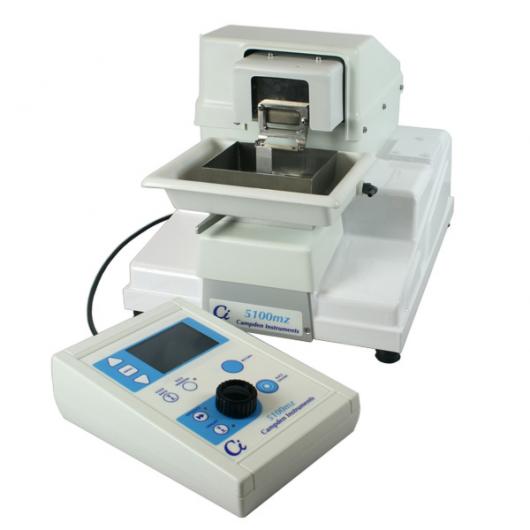
Campden Instruments
Vibratome MZ Plus
Code 5100mz-PlusCampden
The 5100-Plus is perfect for those who need to keep slices viable for longer e.g. for electrophysiological field recordings. The user can calibrate the Z-axis deflection of the blade to 2 µm with the adjustable blade holder and “Opti-cal” Calibration device.
Read more
See other products in applications
Features
Features
- Includes the Z-axis calibration unit (5100mz-Plus only)
- Vibration frequency from 50 to 80 Hz
- Adjustable amplitude from 0.5mm to 1.5mm
- Fine control of the blade advance (min. 0.1 mm/sec)
- Set start and finish position of blade travel
- Remote controls allowing for sterile use in culture hood
- Ice water bath easily removed for cleaning
- Optional cold light and magnifier for clear observation
- Optional Peltier cooled bath
The 5100-Plus is perfect for those who need to keep slices viable for longer e.g. for electrophysiological field recordings. The user can calibrate the Z-axis deflection of the blade to 2 µm with the adjustable blade holder and “Opti-cal” Calibration device. Minimal Z-axis deflection reduces the “chatter” and minimises damage to the slice surface, leading to greater viability of the cells on the slice surface.
The New 5100mz series Vibrating Microtome shares the User interface with the premium 7000smz-2, placing a wide range of adjustable parameters at the user’s fingertips:
- Vibration frequency from 50 to 80 Hz
- Adjustable amplitude from 0.5mm to 1.5mm
- Fine control of the blade advance (min. 0.1 mm/sec)
- Set start and stop position of blade travel
- Control box on umbilical cord ideal for operation in an isolated environment
Use in fully manual or the semi-automated "Slice window" mode which automatically remembers the start and finish position of the slice.
Specifications
- Section thickness step size: 0.001 mm
- Bath table rise & fall speed: 1.0 mm/sec maximum
- Maximum (vertical) travel of bath table: 19 mm
- Cutting head advance speed:
- Minimum: -2.0 mm/sec (-1.00 during slicing)
- Maximum: +2.0 mm/sec (+1.00 during slicing)
- Cutting head retraction speed: 2.0 mm/sec
- Maximum travel of cutting head: 40 mm
- Blade oscillation frequency
- Minimum: 50 Hz
- Maximum: 80 Hz (amplitude dependent)
- Frequency step size: 5 Hz
- Blade oscillation amplitude
- Minimum: 0.5 mm (nominal)
- Maximum: 1.5 mm (nominal)
- Amplitude step size: 0.5 mm (nominal)
- Power requirements (selectable): 115VAC 60Hz, 230VAC 50Hz
- Power rating: 100W
- Fuse rating
- 115V: T2A 250VAC
- 230V: T2A 250VAC
- Light source: Powered from 5100mz
- Dimensions: 350 mm width x 450 mm depth x 350 mm height (excluding magnifier/light source)
- Weight: 15 kg (excluding magnifier)
Components
Extend system with following add-ons
References
- Lovelace, J. W., Rais, M., Palacios, A. R., Shuai, X. S., Bishay, S., Popa, O., … Razak, K. A. (2019). Deletion of Fmr1 from Forebrain Excitatory Neurons Triggers Abnormal Cellular, EEG, and Behavioral Phenotypes in the Auditory Cortex of a Mouse Model of Fragile X Syndrome. Cerebral Cortex. https://doi.org/10.1093/cercor/bhz141
- Rumaner, Horowitz, Ovadya, & Folch. (2019). Thread as a Low-Cost Material for Microfluidic Assays on Intact Tumor Slices. Micromachines, 10(7), 481. https://doi.org/10.3390/mi10070481
- Frischknecht, R., & Happel, M. F. K. (2016). Einfluss der Extrazellulären Matrix auf plastische Prozesse in jungen und alten GehirnenImpact of the extracellular matrix on plasticity in juvenile and adult brains. Neuroforum, 22(1), 1–9. https://doi.org/10.1007/s12269-015-0033-1
- Breach, M. R., Moench, K. M., & Wellman, C. L. (2019). Social instability in adolescence differentially alters dendritic morphology in the medial prefrontal cortex and its response to stress in adult male and female rats. Developmental Neurobiology. https://doi.org/10.1002/dneu.22723
- Tu, T. H., Kim, H., Yang, S., Kim, J. K., & Kim, J. G. (2019). Linoleic acid rescues microglia inflammation triggered by saturated fatty acid. Biochemical and Biophysical Research Communications, 513(1), 201–206. https://doi.org/10.1016/j.bbrc.2019.03.047
- Haskett, D. G., Maestas, D., Howerton, S. J., Smith, T., Ardila, D. C., Doetschman, T., … Vande Geest, J. P. (2016). 2- Photon Characterization of Optical Proteolytic Beacons for Imaging Changes in Matrix-Metalloprotease Activity in a Mouse Model of Aneurysm. Microscopy and Microanalysis, 22(2), 349–360. https://doi.org/10.1017/s1431927616000088
- Yuan, Y., & Atchison, W. D. (2019). Electrophysiological neuromethodologies. In Neuromethods (Vol. 145, pp. 209–231). https://doi.org/10.1007/978-1-4939-9228-7_11
- McCormick, B., Craig, H. E., Chu, J. Y., Carlin, L. M., Canel, M., Wollweber, F., … Vermeren, S. (2019). A Negative Feedback Loop Regulates Integrin Inactivation and Promotes Neutrophil Recruitment to Inflammatory Sites. The Journal of Immunology, 203(6), 1579–1588. https://doi.org/10.4049/jimmunol.1900443
- Monyer, H., Engelhardt, J. von, & Wichert, P. von. (2017). Modulation der Funktion von AMPA-Rezeptoren durch auxiliäre Proteine. E-Neuroforum, 21(2). https://doi.org/10.1515/s12269-015-0009-1
- Rumpel, S., & Triesch, J. (2016). Das dynamische Konnektom. Neuroforum, Vol. 22, pp. 73–79. https://doi.org/10.1007/S12269-016-0048-2
- Shandra, O., Winemiller, A. R., Heithoff, B. P., Munoz-Ballester, C., George, K. K., Benko, M. J., … Robel, S. (2019). Repetitive diffuse mild traumatic brain injury causes an atypical astrocyte response and spontaneous recurrent seizures. Journal of Neuroscience, 39(10), 1944–1963. https://doi.org/10.1523/JNEUROSCI.1067-18.2018
- Reinhard, S., Rais, M., Binder, D. K., Reinhard, S. M., Afroz, S., Hanania, Y., … Razak, K. A. (2019). Reduced perineuronal net expression in Fmr1 KO mice auditory cortex and amygdala is linked to impaired fear-associated memory Osmotherapy to Treat Severe TBI View project Does cell specific deletion of Fmr1 from forebrain excitatory neurons contribute to auditory processing deficits in Fragile-X Syndrome? View project Reduced perineuronal net expression in Fmr1 KO mice auditory cortex and amygdala is linked to impaired fear-associated memory. Article in Neurobiology of Learning and Memory. https://doi.org/10.1016/j.nlm.2019.107042
- Chan, F., Lax, N. Z., Voss, C. M., Aldana, B. I., Whyte, S., Jenkins, A., … Cunningham, M. O. (2019). The role of astrocytes in seizure generation: Insights from a novel in vitro seizure model based on mitochondrial dysfunction. Brain, 142(2), 391–441 https://doi.org/10.1093/brain/awy320
- Fercoq, F., Remion, E., Frohberger, S. J., Vallarino-Lhermitte, N., Hoerauf, A., Le Quesne, J., … Martin, C. (2019). IL-4 receptor dependent expansion of lung CD169+ macrophages in microfilaria-driven inflammation. PLOS Neglected Tropical Diseases, 13(8), e0007691. https://doi.org/10.1371/journal.pntd.0007691

